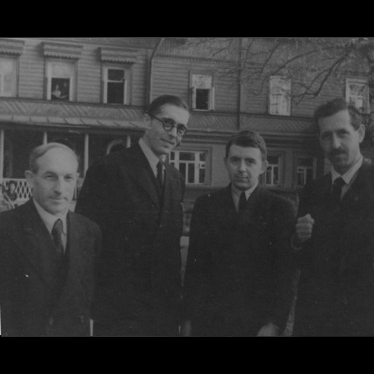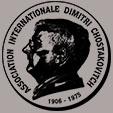Étiquette : Rudolf Firkušný
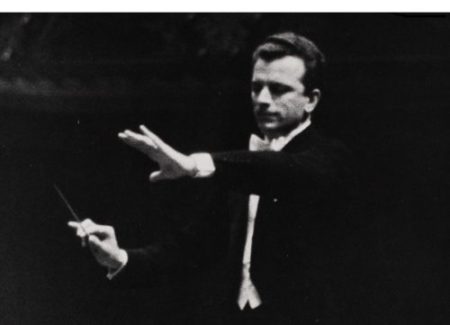
Guido Cantelli – Beethoven
Concerto n°3 Op.37 – Rudolf Firkušný, piano (Steinway) NYPO
Carnegie Hall – March 13, 1955
__________
Symphony n°1 Op. 21 – NBC SO
Carnegie Hall – January 10, 1954
Source: Bande/Tape 19 cm/s / 7.5 ips
Au cours des années cinquante, Firkušný était invité tous les ans à jouer avec le NYPO. En 1955, le choix se porta sur ce concerto de Beethoven, sous la direction de Cantelli. Les critiques du concert du 10 mars ont souligné la qualité de l’interprétation et l’entente entre le soliste et le chef.
Musical America: M. Firkušný et le chef d’orchestre étaient en parfait accord, ce qui a donné lieu à une interprétation bien intégrée. Bien qu’il ait semblé tendu, le pianiste a joué avec sa maîtrise technique habituelle et son tempérament sensible. Le soliste et l’orchestre ont apporté la même éloquence à la musique ».
New York Times: Dans le concerto de Beethoven, M. Cantelli s’est révélé être le plus sympathique et le plus attentif des accompagnateurs. Il a très bien travaillé avec M. Firkušný, et c’était un plaisir d’écouter les attaques et les relâchements tranchants. Le pianiste a joué magnifiquement, en prodiguant des détails d’écriture, en épurant ses phrases et en exécutant l’écriture avec netteté. Ce fut une interprétation élégante de la part de tous les participants, qui a fait ressortir la force et la poésie de la musique sans jamais commettre l’erreur de concevoir le Concerto en do mineur comme l' »Empereur ».
Cantelli a très peu dirigé la Première Symphonie de Beethoven. Son interprétation avec le NBC SO est une réussite et la source utilisée (une bande magnétique) est meilleure que celles des éditions précédentes.
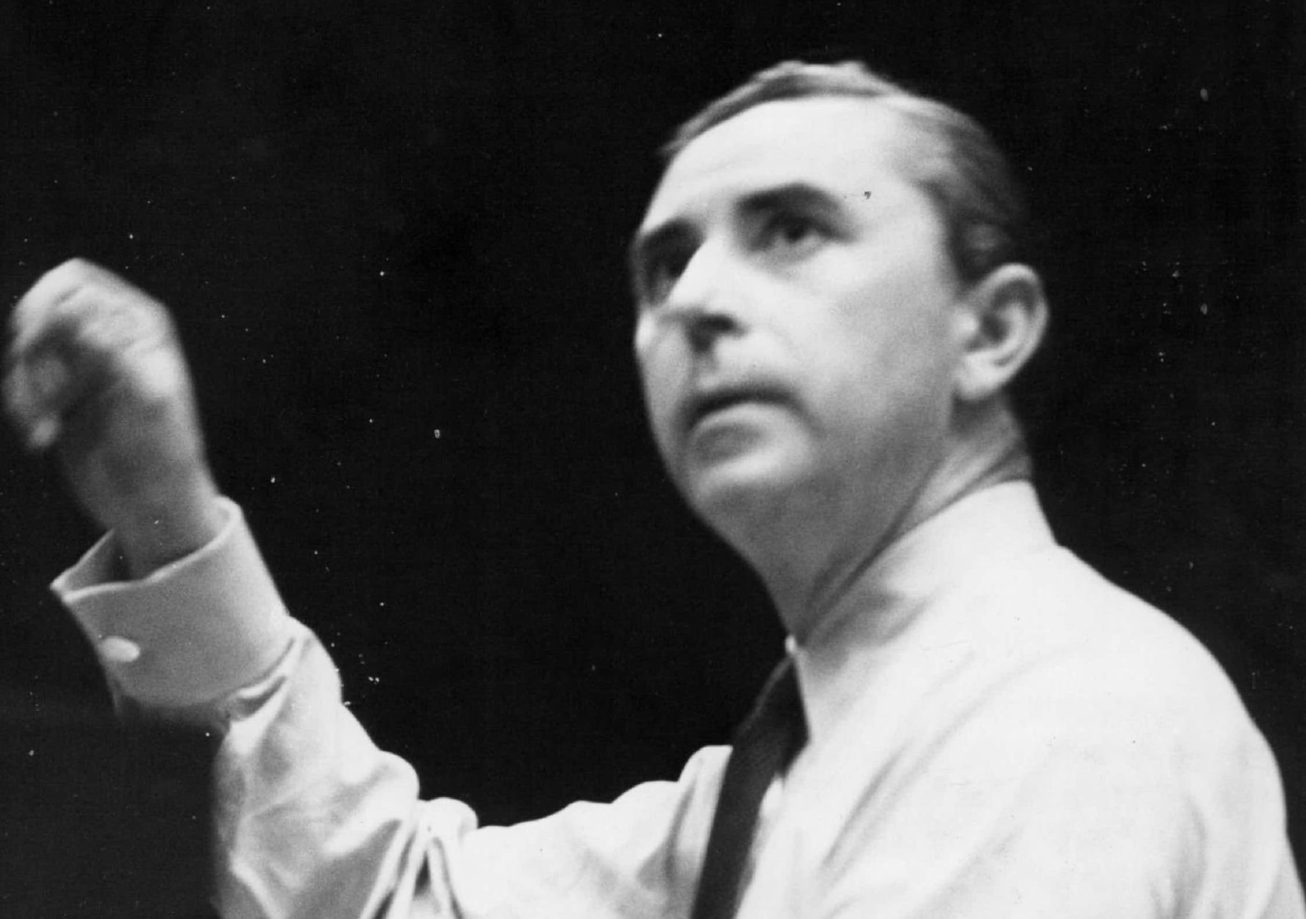
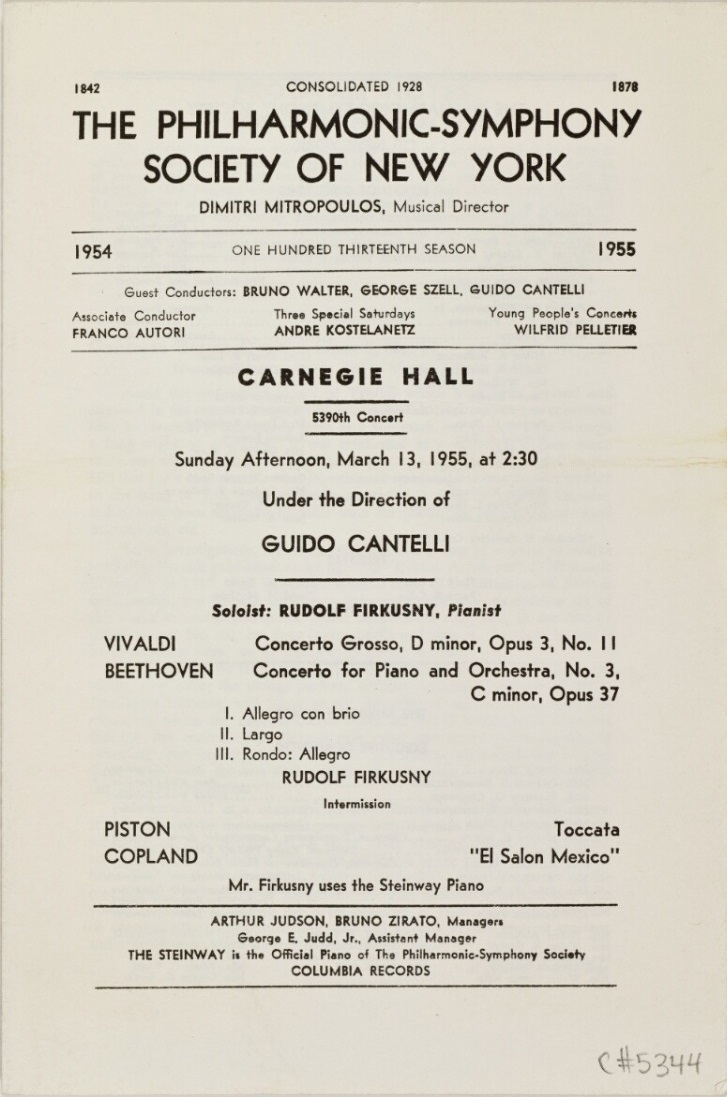
During the 1950s, Firkušný was invited every year to play with the NYPO. In 1955, the choice fell on this Beethoven concerto, conducted by Cantelli. Reviews of the March 10 concert praised the quality of the interpretation and the understanding between soloist and conductor.
Musical America: ‘Mr. Firkušný and the conductor saw eye to eye, and the result was a well-integrated performance. Although he seemed tense, the pianist played with his accustomed technical mastery and sensitivity of temperament. Soloist and orchestra brought equal eloquence to the music’.
New York Times: ‘In the Beethoven concerto, Mr. Cantelli proved to be the most sympathetic and careful of accompanists. He worked exceedingly well with Mr. Firkušný, and it was a pleasure to listen to the sharp attacks and releases. The pianist played beautifully, lavishing detail upon the writing, purling his phrases, bringing clean-cut execution of the writing. It was an elegant performance from all concerned, one that brought out the strength and poetry of the music without ever making the mistake of conceiving the C minor Concerto as the ‘Emperor’ ‘.
Cantelli has rarely conducted Beethoven’s First Symphony. His performance with the NBC SO is a success, and the source used (a magnetic tape) is better than those for previous editions.
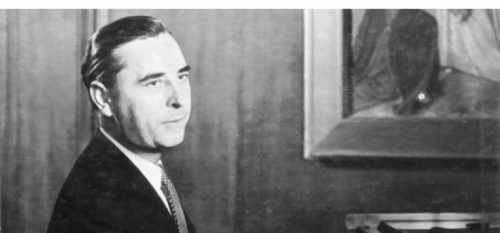
Rudolf Firkušný, piano (Steinway) – Guido Cantelli – New York Philharmonic (NYPO)
Carnegie Hall – April 8, 1956
Source: Bande/Tape 19 cm/s / 7.5 ips
Cette très belle interprétation du Premier Concerto de Brahms provient du dernier concert de Guido Cantelli à New-York.
Le pianiste avait beaucoup d’affinités avec le chef, ainsi qu’il l’a relaté dans une interview:
‘Cantelli était toujours extrêmement bien préparé et dirigeait la plupart des œuvres du répertoire de mémoire. J’ai eu énormément de plaisir à travailler avec lui, car nous avons ressenti une certaine affinité dans nos idées musicales. De plus, sa préparation scrupuleuse de l’orchestre rendait la coopération tout à fait idéale. Les concerts ne pouvaient que bien se passer après sa préparation minutieuse lors des répétitions. Bien qu’il soit exigeant et jeune, il était très respecté par les membres de l’orchestre et, je pense, très apprécié en tant que personne. J’ai été étonné par son évolution régulière et son processus de maturation. Notre dernière prestation a montré que son attitude à l’égard de l’orchestre s’était quelque peu adoucie, sans pour autant faire de concessions sur le plan des exigences’.
Les propos de Firkušný se reflètent bien dans des critiques de cette interprétation parues à l’époque:
Louis Biancolli (World Telegram and Sun) : ‘Avec Guido Cantelli dirigeant l’un de ses meilleurs accompagnements à ce jour, l’interprétation a été passionnante, depuis la force tragique et sinistre des accords d’ouverture jusqu’à la dernière explosion jubilatoire du Finale. M. Firkušný était dans une veine exaltante. Il a apporté une vigueur saisissante aux passages héroïques, donnant à la ligne soliste l’avantage d’un son fort et solide qui n’a jamais perdu de sa résonance. Dans les moments calmes également, il s’est montré un véritable poète, mêlant sonorités douces et sentiments tendres, inscrivant des phrases plutôt que des vers et laissant le plaisir de lire – et de penser – librement entre les lignes……. Depuis dix-huit ans que j’entends M. Firkušný jouer, je l’ai vu devenir l’une des personnalités les plus marquantes du clavier. Cette personnalité n’a jamais été aussi imposante qu’hier soir. Par leur tempérament et leur style, le concerto et M. Firkušný semblent avoir été conçus l’un pour l’autre, tant l’unité de la vision poétique est étroite.’
Howard Taubman (New York Times) : Rudolf Firkušný a donné un coup de fouet au concert philharmonique donné hier soir au Carnegie Hall avec une interprétation passionnante du Concerto en ré mineur de Brahms. Pianiste de tempérament, il a apporté poésie et tension dramatique à une œuvre qui exige un mélange de tendresse et de passion.
Il est aujourd’hui un pianiste majeur, l’un des meilleurs de la profession. Son interprétation de Brahms hier soir en est une nouvelle preuve. Il l’a fait dans la grande tradition. Dans le premier mouvement, qui est un drame puissant en soi, M. Firkušný a joué avec une profondeur et une solidité de ton, avec une compréhension de l’idiome romantique particulier de Brahms et avec une vitalité qui a parcouru toute son interprétation. Et même, à un moment donné, une série d’accords fortissimo était d’une intensité presque choquante. Mais le charme n’a pas été rompu : c’est comme si le pianiste secouait l’orchestre et le public pour les amener à un rapport plus concentré.
Guido Cantelli, qui entamait sa dernière semaine en tant que chef invité, a bénéficié d’un bien meilleur accompagnement de la part de l’orchestre que lorsqu’il avait fait appel cette saison, à deux reprises, à des pianistes solistes. Le mouvement lent, avec son chant soutenu et méditatif, était particulièrement envoûtant, et M. Firkušný s’y est montré un poète sensible, jouant avec une grande richesse de nuances.
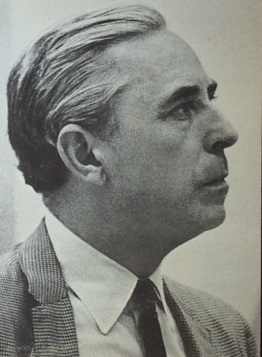
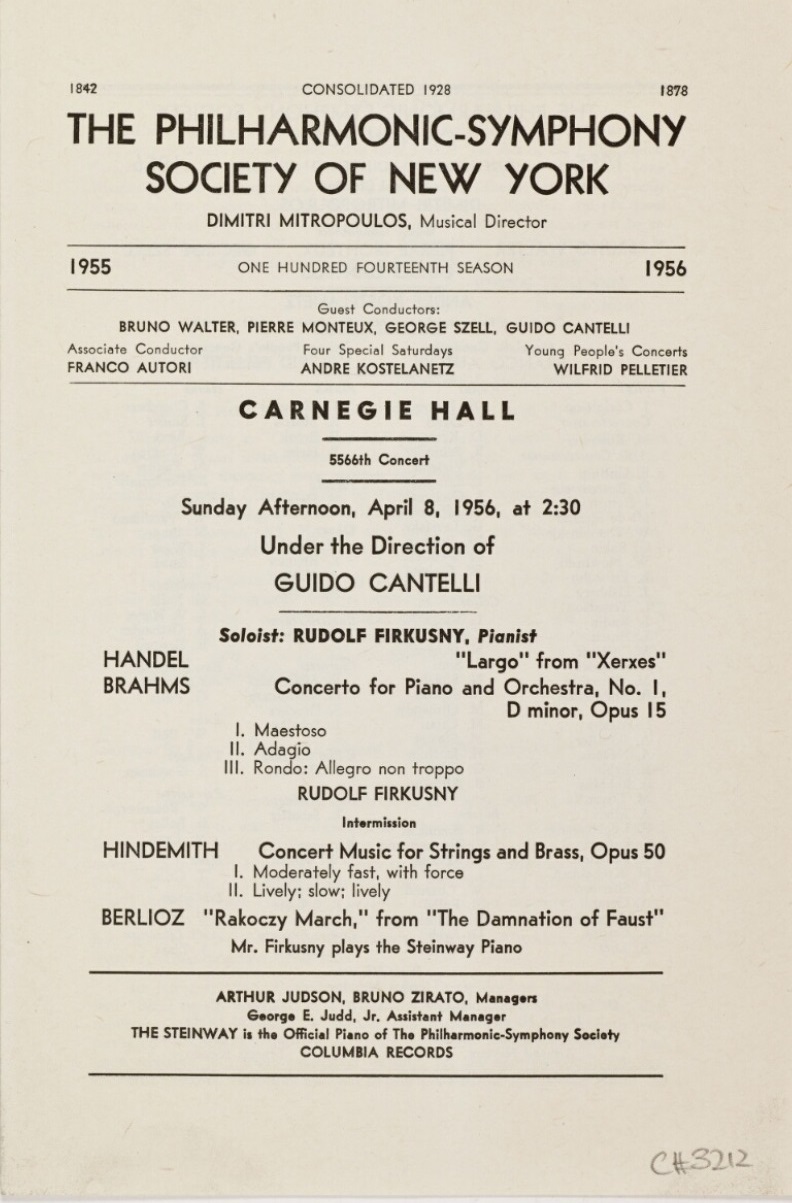
This beautiful performance of Brahms’ First Piano Concerto comes from Guido Cantelli’s last concert in New York.
The pianist had a great affinity with the conductor, as he recounted in an interview:
‘Cantelli was always extremely well prepared, conducting most of the standard repertoire from memory. I enjoyed working with him enormously as we felt a certain affinity in our musical ideas. Also, his scrupulous preparation of the orchestra made the cooperation quite ideal. The performances had to go well after his careful preparation in rehearsals. Although he was demanding and young, he was greatly respected by the orchestra members and I think very much liked as a person. I was amazed by his steady growth and maturing process. Our last performance showed that his attitude towards the orchestra had mellowed somewhat, yet without any concessions in his demands’.
Firkušný’s words are well reflected in reviews of this interpretation published at the time:
Louis Biancolli (World Telegram and Sun): ‘With Guido Cantelli conducting one of his finest accompaniments to date, the performance was a stirring one from the grim tragic strength of the opening chords to the jubilant last flourish of the Finale. Mr. Firkušný was in exalted vein. He brought arresting vigour to the heroic passages, giving the solo line the benefit of a strong, solid tone that never lost resonance. Also in the quiet places he was the true poet, mixing soft-spun sound with tender feeling, inscribing phrases instead of verses and allowing one the pleasure of reading – and thinking – freely between the lines…… In the eighteen years I have heard Mr. Firkušný play, I have watched il grow into one of the most commanding personalities of the keyboard. That personality was never so commanding as it was last night. In temperament and style, the Concerto and Mr. Firkušný seemed to have been intended for one another, so close was the unity of poetic vision.
Howard Taubman (New York Times): ‘Rudolf Firkušný gave a lift to the last night’s Philharmonic concert given at Carnegie Hall with an exciting performance of Brahms’ D minor Concerto. He is a pianist of temperament, and he brought poetry and dramatic tension to a work that demands a commingling of tenderness and passion.
He is now a major pianist, one of the best in the profession. His performance of Brahms last night was further evidence of this. It was in the grand manner. In the first movement, which is a powerful drama in itself, Mr. Firkušný played with depth and solidity of tone, with a grasp of Brahms’ special romantic idiom and with a vitality that pulsed through his entire interpretation. Indeed, at one point, a series of fortissimo chords was almost schocking in its intensity. But, the spell was not brocken: it is as if the pianist were jolting orchestra and audience into more concentrated rapport.
Guido Cantelli, who began his final week as guest conductor, got a much better accompaniment from the orchestra than he had on two previous occasions this season when he had piano soloists. The slow movement, with its sustained, meditative song was especially enamoring, and here Mr. Firkusny was the sensitive poet, playing with a wealth of nuance.’


